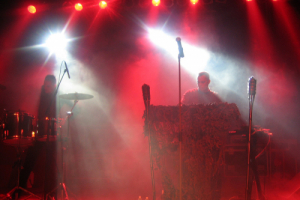
Following up our review of Fur Zwei 3CD+DVD, we thought it would great to dive deeper into the history of one of the most iconic electro bands of the last 30 years. Trial always found ways to tap into the darker regions of electronic music. Erick's extensive and perhaps otherworldly knowledge of sound design combined with Torsten's intense stage presence along with his fierce and fiery vocals surely left a long-standing impression on the fans. Fur Zwei was for the fans. A final Farwell to the Trial legacy. To coincide with this interview, Trial will leave one last parting gift to the fans. A digital single for the track "Feels Like" which was showcased on the DVD which is exclusive to the physical release of Fur Zwei. Erick Miotke will release the digital for Fur Zwei. Remember, if want to see the DVD, you will have to buy the physical release from Electro Aggression Records (Bandcamp). Thanks to Erick for taking some time out his busy schedule to dazzle us with some insight into the world of Trial.
First, congratulations on Fur Zwei. It must have felt great seeing this finally come to fruition. I know this took a long time to compile. Tell us little about how this project came to be. How did you and Torsten meet and ultimately decide to form Trial?
In the summer of 1986, I had my first "band session" ever with Gunnar Duvenhorst, who would continue to have an impact on my musical activities in several occasions, and with whom I am working on the upcoming project Duo for the last two years. The lyrics of the TRIAL track "No More", which features his lyrics on which I build up on the entire track.
Back then we played John Carpenter's main theme of the film Assault on Precinct 13 with a guitar and an e-organ. Unfortunately, the demo that was recorded in the living room of my parents' house has been lost, but it clearly shows what kind of music we then 15-year-olds considered a role model. Next to Depeche mode, Kraftwerk, Soft Cell and also the Cure.
Gunnar (vocals, guitars, songwriting) formed the band Peeping Toms in 1987 with the brothers Marc (synthesizer), Torsten Schröder (drums) and a bass player. It existed until 1990 as a band from the Garbsen Music School, to which I joined in the same year as a keyboardist as a replacement for the bass player who had left.
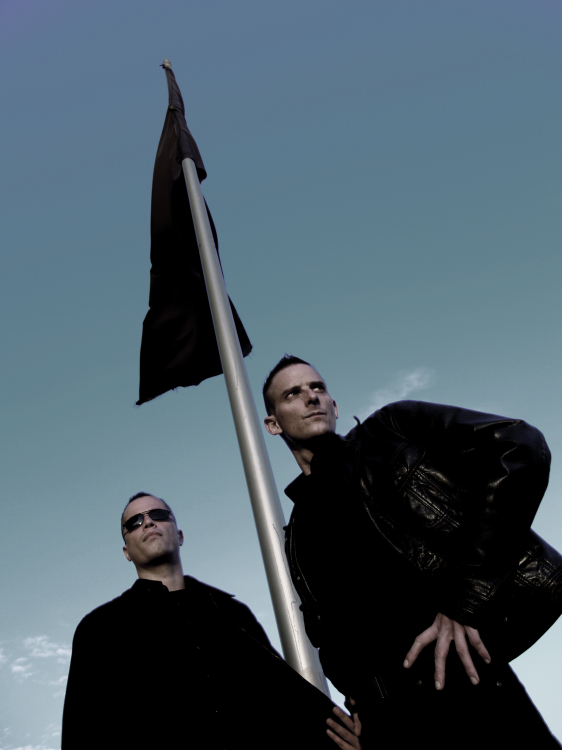
Before that I had recorded my solo project Sounds, Visions and Dreams with 8 tracks at the beginning of 1990, a first unknowingly rough direction for Trial with my own vocals. Very raw, poppy-dark and probably also naive in large parts, but full of conviction that you bring with you as an 18-year-old.
From then on the band was called The Crybabies and continued to be the band of the Garbsen music school under the direction of Torsten's drum teacher Richard Janssen, to whom we and especially I owe a lot. In a large band competition in the Hannover region, we lost first place to the band, The Jinx, who then experienced a notable rise. I will never forget how the bandleader came to us after the award ceremony and said, "Actually you should have won today". A fundamentally honest attitude that I appreciate to this day. The jury and fate made different decisions at the time - and that was probably better for the four of us who were still in the middle of school education.
I often experimented alone after the band sessions in our rehearsal room on a sequencer-based, heavier electronic style, which represented a slightly different direction than the indie-pop orientated project of The Crybabies under Gunnar's songwriting leadership.
Influenced by Skinny Puppy, Front Line Assembly and Front 242, Torsten sang, or better roared some improvised lines after a rehearsal completely freely on my first demo track, inspired by the vocals of Skinny Puppy and Pantera. Gunnar heard that, and said ironically before leaving the rehearsal, "Hard as Krupp steel, or what!?" It was about the fight of the machines against the people. Fiction, as thematically processed in some films of the time and to date. Torsten and I recorded this track later on with him on my Philips d8134 boom box. This device picked up a surprisingly good sound. My equipment at the time consisted of an Ensoniq ESQ-1 and a Roland Boss DR-22A drum computer. Torsten used an Alesis effect rack for the reverb or delay on the vocal track.
Back then I recorded all (possible) 8 tracks live in the Ensoniq ESQ-1 sequencer. That was hard but solid training. An error in the middle, let's say at 2:20 min, or shortly before the end meant: start all over again ... until it was error-free sequenced. I then programmed drum patterns, which I switched live to match while the ESQ-1 sequencer was running. still without a midi connection from the synth and drum computer, I started the two devices synchronously by hand...
In this way, the first 8 Trial titles were created within six weeks, which we were allowed to perform as support for Serpents at our live debut in May 1991 in the Ujz Langenhagen. After the first spinning by the resident of "Blut Und Eisen" in Hanover's black scene club, Index, the track met a great response, and we were booked for this first gig on the same night.
Right after the first gig in the Hanoverian Ujz-Langenhagen we were approached by Kai Lotze, who at the time was freshly active as a manager with the development of Project Pitchfork and their first album. After a short conversation and mutual sympathy, we sealed a handshake for Trial, which lasted until 2011.
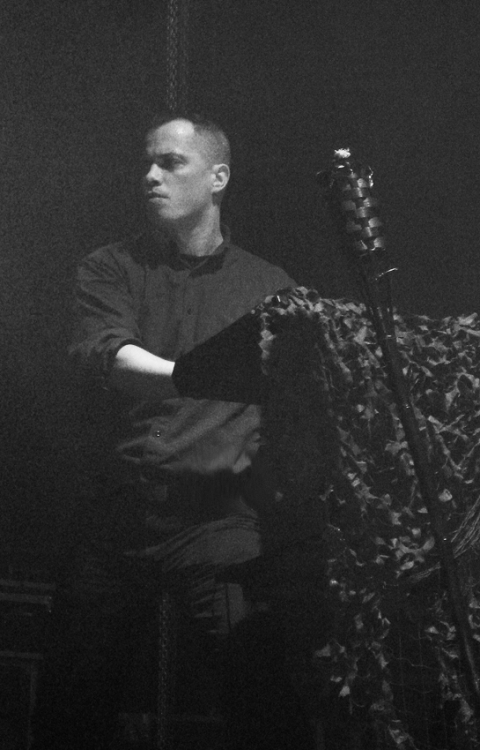
I know you (Erick) did this without the help of your long-time bandmate Torsten. Did you approach him about the Für Zwei project? Why was he not involved?
There has been no contact with Torsten since october 2010. In 2018 I informed him via e-mail about the plan for a Trial release of the previously unreleased material, which he agreed to in a reply e-mail at the time. He wrote: "This can take place for the fans". He himself has finally closed the chapter of Trial. This is also shown by the fact that he did not react to some status reports about the development of the box, as well as not downloading uploads with the new material I sent him.
He hasn't done anything for the project since 2010. Parts of demos and improvisations, from which I have developed some new tracks, are of course to be seen and honored as fundamental contributions, just as his vocal performances are remaining absolutely unique.
What would have been different if Torsten was involved?
If he would have been involved we could have made new tracks or at least new lyrics for the existing demo bits, but this option never existed as said above.
Trial fans know tracks like "Blut Und Eisen", "Diabolic" and "Is It Worth it" are amongst the favorites. What do you remember about the process to creating the iconic track "Blut Und Eisen"? Obviously, "Blut Und Eisen" was everywhere, even here in the USA. It was a DJ staple in the sets. Tell us about the attention it brought to you?
As I mentioned above, it was the first track ever for Trial. "Blut Und Eisen" developed into a scene club hit, and the label Hypnobeat, on which Project Pitchfork was preparing their second album at the time, showed interest. I then invested in a sampling workstation from Ensoniq, the legendary EPS16+. Partly inspired by the tracks of the first tape Gargoyes by Placebo Effect. They had "real" sounds like chainsaws or film samples in their tracks, and I knew that a synthesizer alone would no longer be enough to produce new and expressive titles. With this new tool I reworked "Blut Und Eisen" for the first cd ep to be released in 1992. It just took off everywhere, and made the following production of the first album possible.
It has evolved into several versions over 20 years, but the basic spirit always remained dominant. Every Trial track has grown originally. It can start with a melody, a sample passage or a text as origin. In the end every title has its own story or emotional basis. Everything else builds on this.
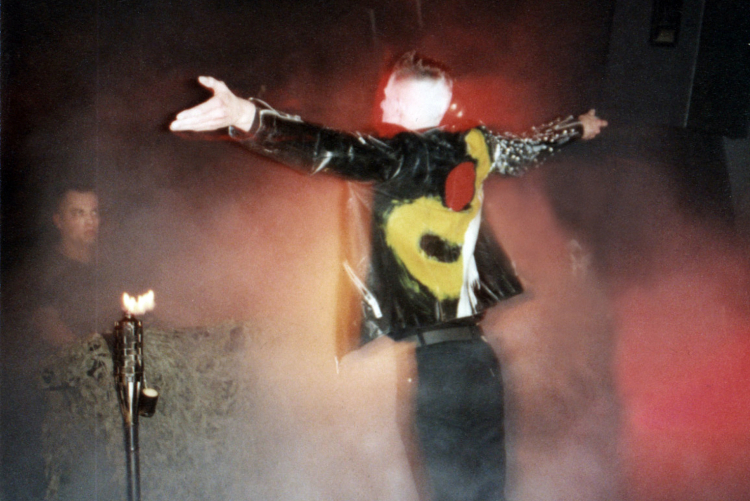
As I revisit Zero Feeling I'm noticing a change in sound. I'm curious about the changes from Zero Feeling to Secret Pain. Was the musical direction different, hardware/software or even looking to expand the sound? Did the label ask for something different?
Yes, there has been a positive development. After the release of Zero Feeling, I started sampling sounds from various sample CDs and other keyboards like the Korg M1 or the Oberheim Matrix 6, and modified them with by for instance resampling them with effects in the Ensoniq EPS16+. On the first album I used far more sounds from the Ensoniq sound library. Also, self-recorded and twitched sounds expanded the sound-universe.
The new label didn`t ask for a different approach. We generated a lot of production time on the second album in the studio and therefore costs. The atmosphere in the studio was great as I remember it. I personally find it interesting how some tracks on the album have developed in a similarly timeless and equal way as some titles of the debut album like one of my all-time favorite tracks from Trial "Sin" is included on it. "Fear", "Snow" and "Obey" are also favorites. We have put a lot of effort into it and we are very pleased with the final recording.
After 1994, there wasn't another album until 2008's No Fate. Why did it take so long follow up Secret Pain?
I started studying in Brunswick in 1994 while Torsten began to work as a barber. We had a short break in 1996, but began again in 1997 to work on new material. In 1999 we recorded a nine-track EP No Fate with Jan-Heie Erchinger. This was rejected by our publisher. It didn´t sound "commercial“ enough, they said. So there was no release of the new material.
I reworked some classic tracks from scratch to lift them on a new production level to let them stand up to the new material for the "comeback" show at the WGT 2001 in Leipzig. Besides the live shows and various remixes we worked on the 24 tracks for No Fate until we were satisfied with this. It took a lot of time, that is correct. We had loads of issues in that period and our hobby had to stand back for them. We also used new recording software besides the classic hardware synth and sampler devices and experimented a lot. Especially Torsten developed his vocal technique to a new level. We finished the double album at last and are proud of it.
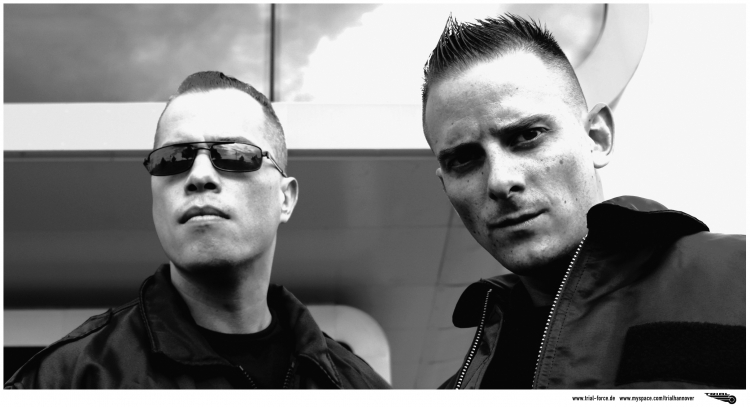
Tell us about the Trial live experience. The DVD portion of Fur Zwei is a glimpse into Trial's stage presence. Torsten looks as intense as a human can get. His eyes are of a man possessed by his passion. You are in the back watching this intensity, what was that like from your perspective? Also, Torsten's live drumming was a cool, yet unexpected treat. Was that something he did often?
The first thing for me in behalf of live shows is, nervousness. Is everything going well with the machines? Is the sound ok? Is everything ok with Torsten? etc. As the backbone of the duo, all responsibility was on me. Torsten always described us as this, "Erick is like the aircraft carrier from which I take off and who covers my back before I land again". A very good description.
In any way, we were both focused on the stage from the first gig. No matter if there was a party before. That was the case from the first gig at the Ujz in Hannover-Langenhagen in 1991 to the last show in 2010 at the Kohlrabi Circus in Leipzig at the WGT 2010. We were always blood brothers. everyone had their task, and it was carried out without wailing. I have to accredit that to Torsten at this point with a big award. There may have been stressful moments about women or something else, stage-time meant delivering without exception.
At the WGT in Leipzig in 2001, Torsten (only once) turned green from tension before the show, or i stood shaking with him at the stage exit before the show in Hannover 2009. As soon as the intro was running, there was only the solid development of the show. From both, even if it meant Torsten in a few (legendary) cases, such as in 2006 at the WGT, throwing up directly and literally off the stage. He continued to deliver without wiping his mouth. That left a heavy impression as deserved.
There is this long-lost track "Force" that appeared on Vol. II of the legendary Art And Dance compilations. Why was that left off? I personally feel "Force" is a powerful and worthy track to be included on Fur Zwei?
We remastered the Classic Anthology with the best tracks of the first three CD releases plus a few tape tracks in 2009 by timetools.de mastering for a release (disc three of the Für Zwei box). We went at that time to the maximum range of a CD capacity with this selection. The track "Force" is in the mastering now as a bonus for the digital release of the box scheduled for February 2022. It is truly a Trial gem, as it is the very first track made with the at the time new Ensoniq EPS16+. A rework for further usage with Trilogy is on the agenda as well, as Jens asks for this since years. Thank you for also asking for it. I love it as well. Pure Trial "younglings" power to me.
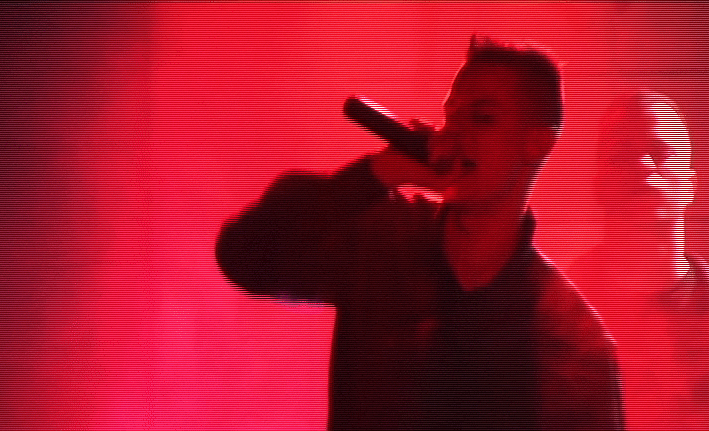
What did the record labels do for you in the early 90's? What was the biggest benefit they provided? Did they have a lot of say in the direction of the releases? What's different now?
We had very great luck with the management of Kai Lotze in context with the success of Project Pitchfork. As I said their label Hypnobeat signed us with our first ep and the debut album. The benefit surely was to be available with the CD releases almost everywhere for the public. Plus, there was no way of directing us in style into any direction. It was some true independent music release at that time.
As is mentioned ahead our publisher in 1999 didn´t like the nine-track EP of No Fate and after that we didn´t have a record deal again and released everything "independently". Until a few years ago digital releases via Timetools-Recordings for all my projects. Our mastering studio and label by Andy Bollsehon and Felix Wolter to whom we stick until today and will for the future. Besides Nader and Electro Aggression Records for the CD releases of Für Zwei and the upcoming double CD, Forced Perspective of Trilogy.
Trilogy and Villaborghese are your current projects. Give us some insight on how these projects came to be.
Trilogy rose out of the ashes of Trial in 2012, a year after Torsten left the project and our friendship. Jens, as a Trial die-hard fan he always was, came in contact with me, and we started the follow-up project in 2012. As I am the writer of almost all Trial tracks, I can move on with this project safely. Trilogy carries on the Trial legacy with a new frontman. The new name was necessary to me, because for instance Depeche Mode wouldn`t be the band without Dave Gahan, just as U2 wouldn`t be the band without Bono.
Bookers told me that this was a mistake because the name Trial would generate more audience, but it wouldn`t be ok to me, and it is a bow to Torsten after all. He is and remains Trial to 50% and all he delivered to the project for 20 years. None the less we must go on, and with Jens and Trilogy we preserve the spirit of Trial and move on into the future.
Villaborghese is a new, and more kind of an "art project" established with Friedhelm Kranz in autumn 2019. I worked with Friedhelm on some different art-projects since 2013. In 2019 he had a sound- and visual-performance in mind, which grew into the current state of this collaboration. We are absolutely free in what we want to do, which is very important to me. We don`t have to serve a style legacy as I have to with Trilogy. It is an open-minded approach to sound and visual design which stands solid in these days with two albums and three EPs available. The preparations for a next ep is forthcoming.
What's a typical day like for you? What are some things you like to do outside of music?
There is of course a difference between working days and the weekend or holidays.
I work as a senior art director in a great agency here in Brunswick. Nine to five, or depending what is to do. I am very happy there since almost 20 years and could experience some great collaborations with people of the team. Such as for instance Tom Grigat, who supported Trial until this day with filming, editing and designing the CGI Mechs and further 3D renderings of Torsten and me, as to be seen in the No Fate and Für Zwei artworks. Just as Friedhelm, who is the co-founder of the agency. Trial, Trilogy and Villaborghese could grow in this environment of a creative surrounding. Just as me. I am a very happy guy with this situation.
So, a typical day is collaboration with truly masterful persons and a place, where the heart is at the right place. Just as sharing the interest in all styles of art and inspiration.
The rest is private and wouldn`t interest any reader here, as i suppose.
Obviously there are a million new bands/artists out there now. Any of them jump out at you and why? Also, from your early promo pictures you had a punk look (my favorite picture with the Mohawks). What were some the punk bands you and Torsten enjoyed?
Yes there are loads of acts. In the last ten years I have two personal outstanding appearances. In 2010, Hurts. What an iconic team! Ok. The third and especially the fourth album can kick up some questions, but the fifth release is again a masterpiece as the first two albums are. Electro pop at its best. I love them. Deeply emotional and credible. I'll watch them closely.
From the point of going tough, Youth Code. What a rush! The pure and unfiltered trademark sound of my personal beginning in hard and relentless electronic music. In studio recordings just as in the live performance. Supported by Rhys Fulber - what more is to say? A dream of mine would be a duet of Sara Taylor and Torsten Schröder. Two devastating performers without limits. Won`t happen, but that would be a true brutal credible force performance! Dream on … haha…
Our "look" was chosen freely. Torsten and his brother Marc were deeply into wave and punk. I was always more into electronics. which was no contradiction in those days. In terms of punk, The Exploited, was and is my first choice. Crazy Wattie Buchan is an instance to me until today. What a guy, some kind of similar to Torsten in my eyes.
Whats next for you?
Für Zwei is the conclusion of Trial for the 30th anniversary. Released in digital and audio format after the hardware boxset on the 4th of February 2022, supported by the last Trial digital single "Feels Like" on the 28th of January 2022. It is not a conclusion. The sound will be continued with Trilogy's double debut album Forced Perspective via Electro Aggression Records in 2022 with 15 original tracks and 15 remixes handpicked by by the label boss Nader Moumneh.
The works with Villaborghese will move on, just as the upcoming project Duo with Gunnar Duvenhorst.
I am very thankful for the still lasting interest in the Trial experience and look on to some new achievements in the upcoming future with the other projects. We never give up. Yours, Erick.
Jan 28 2022
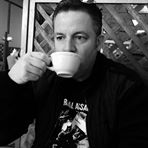
Luke Jacobs
info@brutalresonance.comPart time contributor since 2012 with over 150 contributions with reviews, interviews and news articles.
Share this interview
Facebook
Twitter
Google+
Shares
Popular interviews
Psyclon Nine
Interview, Mar 24 2017
Night Runner
Interview, Oct 13 2016
Testube
Interview, Apr 02 2022
Kite
Interview, Feb 10 2017
God Destruction
Interview, May 17 2016
Related articles
Trial - 'Fur Zwei'
Review, Nov 26 2021
Psy'Aviah - 'Futurepast'
Review, Jul 01 2013
A.T Mödell - 'Wired for Evil'
Review, Sep 03 2014
Front Line Assembly - 'Echogenetic'
Review, Jun 25 2013
SinThya - 'The Silence'
Review, Dec 06 2020



